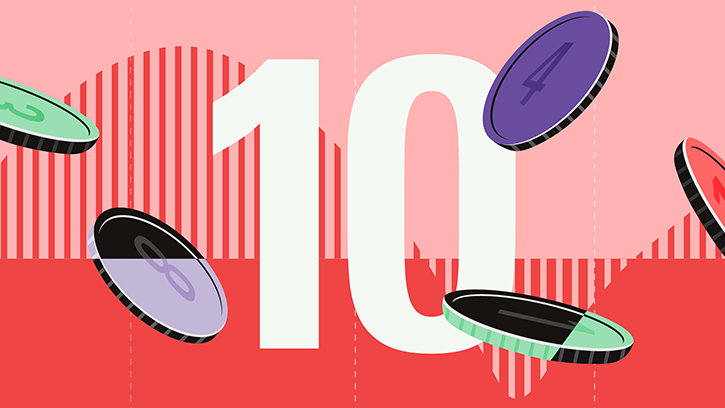
Global markets fell sharply at the start of the week as investors digested the likelihood of a US recession, the rapid end of the US tech boom and the sudden appreciation in the Japanese yen.
Stocks had already started to fall on Friday following the release of US monthly jobs numbers and the sell-off accelerated into the Asian market open on Monday, where Japan’s Nikkei index suffered its worst ever points fall – and biggest percentage fall since 1987, losing 12% in one trading session before recouping most of the losses on Tuesday.
US indices fell sharply on Monday, with the S&P 500 and Nasdaq Composite indices closing about 3% lower. The Morningstar Global Markets Index closed more than 3% lower, while the FTSE 100 and Europe's Stoxx 600 benchmark each fell 2%. Volatility indicators like the VIX spiked to levels last seen in the 2020 pandemic sell-off.
Morningstar markets reporter Sarah Hansen said: "Long-held worries about losses caused by an overvalued, overly concentrated market appeared to materialise on Monday.
"It was a dramatic turnaround after two years of blockbuster returns driven by enthusiasm over artificial intelligence, resilient corporate profits, and the prospect of a rare soft landing for the economy."
Japanese stocks recovered on Tuesday, with the main index closing up 10%, while European markets were largely rangebound after Monday's falls. US futures suggest markets are likely to rise at the open on Tuesday.
What Happened on Friday?
Investors were jolted by the July non-farm payroll numbers on Friday, which upset the 2024 market narrative that the US economy would escape a hard landing. The unemployment rate rose to 4.3% and the US added 114,000 jobs in July.
Steven Bell, chief economist at Columbia Threadneedle, explained the context in a note on August 5:
“Weak US labour market numbers have led to widespread fears that the US is heading into recession. Data has triggered the “Sahm Rule” – an indicator that’s been accurate in predicting recessions and their timing." The rule states that if the three-month average of the US unemployment rate rises by 0.5% above the lowest three-month average over the prior year, a recession has started.
“This is cause for concern, but closer examination suggests it could be a false alarm.”
Rob Morgan, chief investment analyst at Charles Stanley, said in a note that the job numbers add to other US economic concerns: “Other data has been disappointing too. There are worries manufacturing is weakening and that US consumers are about to hit the spending buffers because they have exhausted their post-Covid build-up of savings.”
What’s Going on With the Federal Reserve?
Last week the Fed held rates again, with the expectation that the central bank will cut rates in September. Pressure is now growing on the Federal Reserve to cut rates sooner than that to calm markets and save the US economy. Most western central banks have already done so, with the Bank of England making its first cut last week since 2020. Hansen added:
"The cooler-than-expected data lent credence to a question gaining momentum among market watchers: did the Fed wait too long to cut interest rates?"
Why is Currency Involved?
Key to the market turmoil are the US dollar and Japanese yen. The status quo that has supported record highs for global markets this year has been high interest rates in the US (5.25% - 5.50%) and low rates in Japan (0.25% after last week’s rate rise).
Traders have been able to borrow in yen, which until this week was at multi-decade lows and invest in higher-performing US dollar-denominated assets like tech stocks and US bonds. This process is known as the “carry trade” and held until Friday, which saw a slump in the dollar on fears over the US economy. The Federal Reserve is now forecast to cut interest rates faster than expected and before the next meeting, which will put pressure on the dollar. At the same time, the Bank of Japan has been supporting the yen, and last week raised interest rates for the second time this year.
Traders have been forced to close their derivative positions as the dollar has slumped from JPY160 to JPY140 in matter of days, a huge move in currency markets. This scramble to exit trades has exacerbated the sense of panic.
Should I Sell Tech Stocks?
Bear in the mind that the fall in tech stocks has to be put in the context of some massive gains. Nvidia (NVDA) shares are up 2,500% over five years but lost 6% on Monday.
John Moore, senior investment manager at RBC Brewin Dolphin, said: “The sell-off of the past few days is, in part, some of the recent froth that has developed in the share prices of tech stocks being blown away. But, once it has settled, this could represent a buying opportunity for investors who believe in the long-term prospects of the sector.”
Many companies like Amazon (AMZN) are now screening as undervalued, according to Morningstar analysts.
Should I Sell Japan Stocks and Funds?
Not necessarily. Like the tech stocks, Japanese markets have had a very good run over the last few years, and this latest correction has dented the performance numbers without undoing all the gains. Many managers point to fundamental factors like corporate governance reforms as drivers of domestic equity gains, rather than just yen weakness.
James Salter, CIO and manager of the Zennor Japan Fund, said in a note that Japan's exporters could struggle after their stellar run but more domestically focused Japanese stocks, which have been left in the shade in the bull market, could now shine.
“A stronger yen seems likely. This will lead to a bifurcated market where I suspect the 'winners' of the last year bounce short-term but thereafter struggle. Many of these names are yen sensitive and exposed to the global economic cycle.”
What Should Investors Do?
Morningstar behavioural experts urge investors not to panic, a message they stressed during the 2020 pandemic sell-off, which was extremely sudden but also shortlived – and in hindsight a huge buying opportunity. Morningstar investment specialist Susan Dziubinski has upated her guide to market uncertainty:
"Investors often hear that they should tune out the market’s noise and not pay attention to market turbulence. But tuning out can be hard to do—and in some cases, it could be a mistake," she says.
Director of ratings Russell Kinnel has looked at the Monday's US market movements: "In all, it was a tough morning, but hardly a rout."
Morningstar chief US market strategist Dave Sekera said: “Considering the market valuation was trading above a composite of our fair value estimate, we are not necessarily surprised to see this selloff. However, while selloffs like this are unusual, they’re not uncommon and not a reason to panic.”
This story was updated at 11:27 BST on 6 Aug. 2024





























